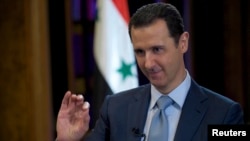Syrian President Bashar al-Assad has congratulated his key ally, Iran, for clinching a nuclear deal with world powers, describing the agreement as a “major turning point" and saying he expected Iran to increase its support of “just causes" in the region.
Analysts say the potential of freeing up of billions of dollars in frozen Iranian assets will likely benefit Assad, with Tehran having a greater capacity as a consequence of the Vienna deal to continue to keep propping up the Syrian dictator with financial and military support.
“In Syria, where the Iranian government serves as a main prop for President Bashar al-Assad’s embattled government, the opposition is predictably unhappy with the news,” according to Aron Lund, a Syria expert at the Carnegie Endowment for Peace, a Washington, D.C., based think tank.
“But the president [Assad] himself is jubilant, and he swiftly fired off a congratulatory telegram to Iranian Supreme Leader Ayatollah Ali Khamenei in which he lauded the ‘historic achievement,’” he said.
Syria fallout
U.S. President Barack Obama did not address the possible Syria fallout from the Vienna nuclear deal with Iran. U.S. lawmakers opposed to the agreement are likely to raise it is a key issue in their review of the deal.
U.S. Secretary of State John Kerry said midweek it is too early to know, however, whether Iran will use new revenue and up to a $150 billion in unfrozen assets it secures as result of the agreement to further assist Assad.
U.S. administration officials say the Vienna deal was about solving one challenge, Iran’s nuclear development, but that throughout the months-long bargaining process they have sought to convert Iran from a foe into a friend and pointed out to their Iranian counterparts the “constructive role” Tehran could play in the region.
They argue the Vienna deal is a stepping stone.
While Syria will not suddenly find itself the beneficiary of substantial new military hardware courtesy of Tehran thanks to the slow pace of the lifting of an arms embargo on Iran, Lund argues the Vienna deal is “likely to ensure the growing financial and political clout of his [Assad’s] most reliable ally.”
Money, logistics
Iran’s economic and logistical contributions to Assad’s war efforts are crucial, the analyst argues.
In May, Tehran extended a new $1-billion credit line to Assad, throwing Syria’s failing economy a life-line. The credit line was ratified just days ago. Economic strain has been draining Syria, and Assad’s beleaguered regime has been stretching for any cash it can generate, from raising taxes on imported goods to doubling fees for the renewal of passports.
The four-year-long civil war coupled with the international economic sanctions on Iran and Russia are reducing what aid Assad’s foreign backers can give.
The war has battered the Syrian economy, say analysts. Syrian field commanders have been heard in radio communications intercepted and published by rebels resorting to pleading with their superiors in Damascus for resupplies.
According to the office of the U.N. special envoy for Syria, Staffan de Mistura, Tehran has been spending $6 billion annually to prop up the crumbling Assad regime, an estimated $24 billion since the civil war erupted after the brutal suppression of reform protests.
But estimates vary greatly as to how much Iranian support for Assad is costing Tehran. Steven Heydemann at the U.S. Institute of Peace told Bloomberg the value of Iranian oil transfers, lines of credit, military personnel costs and subsidies for weapons for the Syrian government likely was between $3.5 and $4 billion annually.
He said that did not include, though, how much Iran was spending on supporting Hezbollah, the radical Shia Lebanese movement, and other Shia militias fighting on Assad's side in the war.
The Western and Gulf-backed opposition group, the Syrian National Coalition, has bewailed the Vienna deal, fearing it will mean more bombs and bullets and more Shia militiamen for Assad.
Coalition's assertions
In a statement issued Tuesday, the group said, “In Syria, Iran is offering a lifeline to Assad by providing arms, financing, training, and paying monthly salaries for Afghans and other foreign Shia mercenaries coming to Syria to fight for Assad. Iran is almost certainly going to use the newly available cash and bolstered economy to prop up its proxies and try to assert its hegemony in the region, causing more conflict and bloodshed.”
The coalition’s secretary general, Mohammed Yahya Maktabi expressed growing concern Wednesday over the deal on Iran’s nuclear program, saying the agreement had been struck at the expense of other regional issues.
In a statement he argued, “We have deep fear that Iran will use the money that is going to be released as part of the deal to step up is intervention in the region, thus further fueling the war.
"No doubt the Iranian regime will use these assets to prop up Assad, who will use them to sustain its killing machine and hold on longer to power,” said Maktabi.












